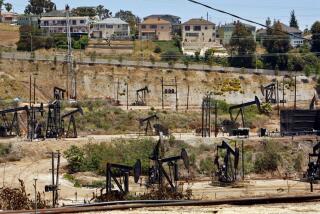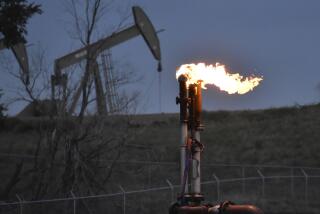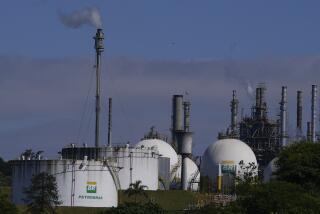Methane emissions drop at natural gas drilling sites, study says
WASHINGTON — Emissions of methane from natural gas well sites across the United States have fallen in a key part of the drilling process, despite the boom in natural gas development, according to a study published Monday.
The rise in natural gas production through hydraulic fracturing, or fracking, has stoked concerns about leakage and venting into the atmosphere of methane, a chief component. Far more carbon dioxide is emitted than methane, but methane is 72 times more potent than carbon dioxide over a 20-year period.
Researchers from the University of Texas found, however, that new equipment reduced emissions last year at 190 natural gas sites by 99% in one key step in the well-drilling process.
The new study, published in the Proceedings of the National Academy of Sciences, indicates that the air pollution is being dramatically reduced as energy companies deploy technology to comply with impending federal environmental regulations. The energy industry often has decried Environmental Protection Agency efforts to oversee natural gas development, arguing that state-level regulation is adequate.
“The study says that the EPA’s efforts aren’t over-regulation, and that in fact they’re effective,” said Steven Hamburg, chief scientist for the Environmental Defense Fund, a sponsor of the study, along with nine oil and gas companies.
Reaction from industry officials was unsurprising.
“We welcome the finding that overall methane emissions from the production of natural gas are lower than the most recent EPA estimates,” said Erica Bowman, vice president of research for America’s Natural Gas Alliance, a trade group. “Greater use of natural gas can substantially reduce greenhouse gas emissions.”
The reductions were noted during the well-completion phase of drilling, which involves preparing for production by cleaning out the sand and liquids injected into the well during the drilling phase.
Although well-completion work emitted less methane than EPA estimates, the study found that other phases of production showed higher levels of methane leakage from valves and other equipment at well sites. The EPA does not regulate emissions from the equipment, the authors said.
Some environmental groups dismissed the study because energy companies co-sponsored it.
“This industry-sponsored ‘study’ is more spin than science,” said Wenonah Hauter, executive director of the environmental group Food & Water Watch. “The Environmental Defense Fund is running interference for the industry, and the result will be more drilling and fracking around the world.”
The authors pointed out that their study is the first of 16 the Environmental Defense Fund is conducting with a range of partners in academia and industry, and they noted the study’s limitations, including that the wells sampled were only a small portion of the approximately 447,000 gas wells in the country.
More to Read
Sign up for Essential California
The most important California stories and recommendations in your inbox every morning.
You may occasionally receive promotional content from the Los Angeles Times.











